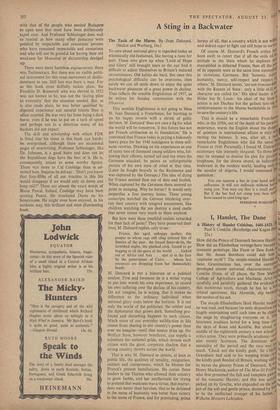A Sting in a Backwater
The Taxis of the Marne. By Jean Dutourd. (Seeker and Warburg, 16s.) The Taxis of the Marne. By Jean Dutourd. (Seeker and Warburg, 16s.) To care about national glory is regarded today as whimsically old-fashioned, like having a taste for port. Those who grew up when 'Land of Hope and Glory' still brought tears to the eye find it difficult to adjust themselves to Britain's reduced circumstances. Old habits die hard. But once this psychological difficulty can be overcome, then surely we can all settle down to enjoy the quiet backwater pleasures of a great power in decline. Thus reflects the sensible Englishman of 1957, as he enjoys his Sunday communion with the Observer.
This sensible Englishman is not going to bless M. Jean Dutourd, a Frenchman, for bursting in on his happy reverie with a shriek of gallic derision. M. Dutourd 'does not care a fig for what the world will be tomorrow, if this future has not got French civilisation as its foundation.' He is convinced that France today is paying a hideously heavy price for her 1940 indulgence in these self- same reveries. Drawing on his experiences as one of many tens of thousand young soldiers who, fol- lowing their officers, turned tail and ran when the Germans attacked, he paints an unforgettable picture of his own state of mind at that time. (Later he fought bravely in the Resistance and was captured by the Gestapo.) The idea of dying for France seemed then out of date and foolish. When captured by the Germans there seemed no point in escaping. Why be heroic? It would only jeopardise a free journey home. These young conscripts watched the German blitzkrieg over- run their country with resigned amusement, like children watching the sea destroy a sand castle that never meant very much to them anyhow.
But how were these youthful realists rewarded for their lack of pains? They have preserved their lives, M. Dutourd replies, only to see :
France, this aged, unhappy mother, this pauper to whose rags still cling tattered bits of fineries of the past: the frayed fleurs-de-lis, the tarnished eagles, the plucked cock, forced to go begging at all the gates of the world . . . kicked out of Africa and Asia . . . spat at in the face by the guttersnipes of Cairo . . . whose last resources are dropping from her rheumaticky hands.
M. Dutourd is not a historian or a political analyst. First and foremost he is a writer trying to put into words his own experience, to record his own suffering over the decline of his country. Do not imagine, he is saying, that it makes no difference to the ordinary individual when national glory sinks below the horizon. It is not only the world of the politician, the soldier and the diplomatist that grows dark. Something pro- found and disturbing happens to each citizen. Much more of our everyday satisfaction in life comes from sharing in our country's power than ever we imagine—until that source dries up. No Welfare State, however beneficent, can supply a substitute for national pride, which invests each citizen with the giant, corporate shadow that a strong country throws across the world.
That is why M. Dutourd so detests, at least in public life, the qualities of timidity, resignation, caution and compromise, which he blames for France's present humiliations. He curses those leaders in the Thirties who allowed their country to grow feeble, and her intellectuals for trying to pretend that weakness was a virtue, that Martyr- dom was better than heroism, that to be defeated in the name of humanity was better than victory in the name of France, and for pretending, prime heresy of all, that a country which is not williol and indeed eager to fight cart still hope to survivt' Of course M. Dutourd's French critics hats been swift to retort that if all the evils of (I't attitude to the State which he deplores ore° exemplified in defeated France, then all the el of its opposite were at the same time exemplifi in victorious Germany. But 'honesty, justice' humanity, mercy, self-respect and respect , others,' M. Dutourd insists, 'are not irreconcilab"; with the Reason of State : only a little skill 0,1 character are called for.' His ideal leader is 01 Hitler but St. Louis : his ideal of the State action is not Dachau but the gallant taxi-ing reinforcements to the Marne battlefields in 191 to save the country's life.
That it should be a remarkable Frenctarati who, in the 1950s, out of the depth of his persona', experience, warns the English about the dangers of quietism in international affairs is only Or: recting the balance. It was, after all, a ve,c7, p; remarkable Englishman who did the same r°,` S France in 1940. Personally, I found M. Dutourd; cautionary tale intensely eloquent. To those v','h may be tempted to dismiss his plea for patrionc It 'toughness, for the drawn sword, as ludicrously irrelevant in the modern world, leading only 1(7, the squalor of Algeria, I would commend Iii 1c
quotation : si
You can squeeze a bee in your hand unli1j,1 It suffocates. It will not suffocate without hao" stung you. You may say that is a small mathifj But if the bee had not stung you, bees well have ceased to exist long-ago.
PEREGRINE WORSTI3






























 Previous page
Previous page